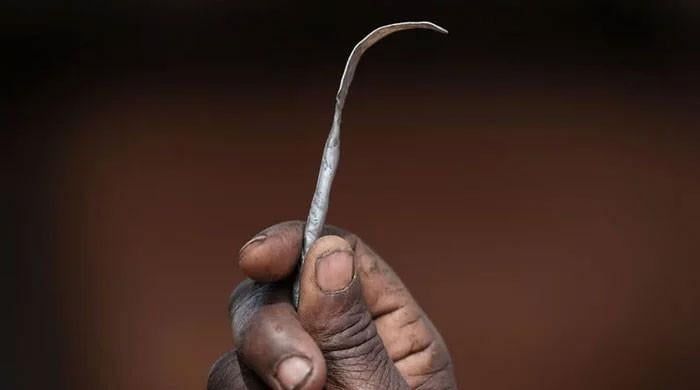TOUBA/IVORY COAST: In a rather disturbing revelation, it has emerged that mutilated genitals of young girls in Ivory Coast were being sold for use in “magic” and other rituals.
As reflected in extensive interviews with former healers, circumcisers, social workers, researchers and non-governmental organisations (NGOs), there is a thriving traffic in female genitalia for the powers they supposedly confer.
Many are convinced that the trade is hampering the fight against female genital mutilation (FGM), a practice that has been banned in Côte d'Ivoire for more than a quarter of a century.
However, according to the OECD, one in five Ivorian women is still mutilated, and one in two in some areas of the north.
A ground clitoris can sell for about $170, the equivalent of what many people in the country earn in a month.
The director of the National Organization for Women, Children and Family (ONEF), Labe Gneble, says that genitals cut off from girls in illegal “circumcision” ceremonies are used in several regions of the West African country to “make love potions” or magic ointments that some believe will help them “make money or reach high political positions.”
Moussa Diallo, when he was a witch, periodically anointed himself with a lotion made from the severed clitoris of a girl who had undergone female genital mutilation.
“I wanted to be a big boss, I wanted to dominate,” explains this small but charismatic fifty-something from the north-west of the Ivory Coast.
“I put it on my face and body” every three months or so “for about three years,” said Diallo, who asked AFP do not use your real name.
Diallo stopped using the anointing a decade ago, but regional police chief Lieutenant N'Guessan Yosso confirmed AFP that dry clitorises remain “highly sought after for mystical practices.”
Mixed with plants
Before suffering a crisis of conscience and deciding to campaign against female genital mutilation, Diallo said women performing excisions around the small town of Touba often asked her to use her powers to protect them from evil spells.
Female circumcision has been practiced by different religions in West Africa for centuries, and most girls undergo this practice between childhood and adolescence.
Many families consider it a rite of passage or a way to control and repress female sexuality, according to the United Nations Children's Fund (UNICEF), which condemns female circumcision as a dangerous violation of girls' fundamental rights.
Beyond the physical and psychological pain, cutting can be fatal and cause sterility, complications during childbirth, chronic infections and hemorrhages.
Diallo would often accompany women undergoing circumcision to the forest or to a house where dozens of girls were circumcised, often surrounded by fetishes and sacred objects. So it was relatively easy for the ancient healer to obtain the precious powder.
“When they cut off their clitoris, they dried it for a month or two and then beat it with stones,” she said.
The result was a “black powder” that was sometimes mixed with “leaves, roots and bark” or shea butter, which is often used in cosmetics.
They could then sell it for around “100,000 CFA francs if the girl was a virgin” or “65,000 if she already had a child” or exchange it for goods and services, Diallo added.
The former witch said he was recently able to obtain some dust (a mixture of human flesh and plants, he believes) from a cutter in his village.
AFP They showed me the powder but I couldn't test it without purchasing it.
Organ trafficking
Former circumcisers interviewed by AFP He insisted that girls' severed clitorises should be buried, thrown into a river, or given to their parents, depending on local custom.
But one in the west of the country admitted that some end up being used for magic.
“Some people pretend to be the girls' parents and leave with the clitoris,” he said.
Witch doctors use them for “enchantments” and then sell them, he said.
Another circumciser said some of his colleagues were complicit in the trade, “handing over (genitals) to people with bad intentions” for ulterior motives.
Mutilated when she was still a child, a victim said AFP that his mother warned him to bring home the meat that had been cut up.
The trade is considered “organ trafficking” under Ivorian law and is punishable, like female genital mutilation, by fines and several years in prison, said lawyer Marie Laurence Didier Zeze.
But police in Odienne, which is responsible for five regions in the northwest of the country, said no one has ever been charged with trafficking.
“People don't say anything about sacred practices,” lamented Lieutenant N'Guessan Yosso.
The cutters themselves are feared and respected, locals said. AFPoften seen as prisoners of evil spirits.
Only nuts
“The clitoris doesn't give you magic powers, it's crazy,” says gynecologist Jacqueline Chanine, based in Abidjan, the country's commercial capital.
Still, according to researchers, the practice remains widespread in some parts of the country.
Dieudonné Kouadio, a health anthropologist, received a box of powder in the town of Odienne, 150 kilometres north of Touba.
“It contained a cut and dried organ in the form of a blackish powder,” he said.
Her discovery was included in a 2021 report by the Djigui Foundation, whose conclusions were accepted by the Ministry of Women.
Farmers in the Denguele district, which includes Odienne, “buy clitorises and mix the powder with their seeds to increase the fertility of their fields,” explains Nouho Konate, a member of the Djigui Foundation, which has been fighting female genital mutilation in the area for 16 years.
She said the girls' parents were “devastated” when she told them about the trafficking.
Further south and in the country's midwest, women use clitoris powder as an aphrodisiac, hoping to keep their husbands from leading them astray, said criminologist Safie Roseline N'da, author of a 2023 study on female genital mutilation that also flagged the trade.
She and her two co-authors discovered that the blood of cut women was also used to honour traditional gods. According to lawyer Didier Zeze, these home remedies are not the only ones in Ivory Coast that use body parts.
Mystical beliefs, a determining factor
“The mystic occupies a central place in daily life” in the Ivory Coast, where Islam, Christianity and traditional animist beliefs coexist, says Canadian anthropologist Boris Koenig, a specialist in occult practices there.
“It affects all spheres of people's social, professional, family and love life,” he said, and there is nothing illegal about it in general.
However, trade is “one of the reasons why FGM survives” in Ivory Coast, say NGOs, where the rate of female genital mutilation is generally declining and is below the West African average of 28%, according to the OECD.
Back near Touba, former witch Diallo recalled how up to 30 women were cut a day in the places protected by his magic.
The dry season, between January and March, is the preferred period for circumcisions, when the warm Harmattan wind from the Sahara helps heal the scars, he said.
Staff at the region's only social work centre say cuts are still ongoing, but it is difficult to quantify them because they never happen openly.
Instead, the practice continues in secret, hidden behind traditional festivals that have nothing to do with the practice, and are said to be carried out by circumcisers from neighbouring Guinea (just a few miles away), where FGM rates exceed 90%.












